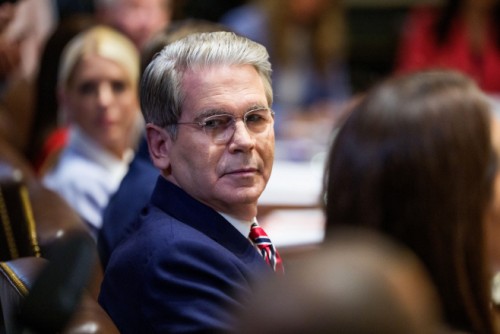 |
| Scott Besant, U.S. Treasury Secretary, attends a Cabinet meeting at the White House in Washington, D.C., on August 26. / Source: EPA-Yonhap News |
U.S. Treasury Secretary Scott Besant has raised the possibility that the Trump administration could acquire stakes in American shipbuilding companies, following its recent investment in the semiconductor sector. Commerce Secretary Howard Rutnik separately said Washington is also considering taking stakes in defense contractors, while using foreign investments from allies like South Korea and Japan to strengthen U.S. infrastructure.
Besant told Fox Business on August 27 that while a government stake in Nvidia is unlikely—"I don’t think Nvidia needs financial support, so that’s not on the table right now"—shipbuilding could be next. "Industries like shipbuilding, which we are restructuring, are essential for U.S. self-sufficiency. These are areas we neglected for 20, 30, even 40 years," he said.
If realized, such a move could affect South Korea’s $150 billion “MASGA” shipbuilding project in the U.S., part of a broader $350 billion Korean investment package. Trump officials argue that 90% of the project’s profits will remain in the U.S., framing it as “reinvestment,” while Seoul views it differently.
The remarks came shortly after Washington announced $8.9 billion in subsidies under the CHIPS Act and a deal to acquire a 9.9% stake in Intel, amounting to more than 433 million shares at $20.47 apiece.
Besant appeared skeptical about government stakes in defense companies, however. "I don’t know if we need to own defense contractors," he said, suggesting federal equity should target lagging industries like semiconductors and shipbuilding instead.
Rutnik, speaking to CNBC a day earlier, emphasized that defense-sector discussions were “serious,” calling Lockheed Martin—whose 97% of revenue comes from the U.S. government—"practically a government arm." He said final decisions would rest with the Pentagon.
Crucially, Rutnik underscored that South Korean and Japanese investments would help fund U.S. infrastructure. "We will see a national economic security fund built with money from Japan, Korea, and others. They will finance America’s infrastructure," he said. "This isn’t about tariffs—it’s about countries that fundamentally understand that a strong America is essential for global success."
Most Read
-
1
-
2
-
3
-
4
-
5
-
6
-
7





















